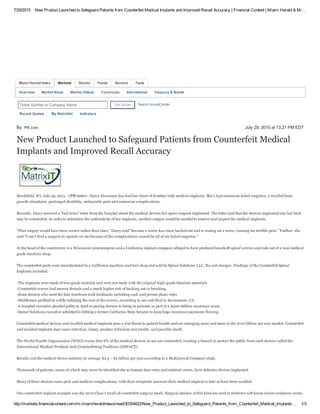New Product Launched to Safeguard Patients from Counterfeit Medical Implants and Improved Recall Accuracy _ Financial Content _ Miami Herald & MiamiHerald
- 1. 7/29/2015 New¬†Product¬†Launched¬†to¬†Safeguard¬†Patients¬†from¬†Counterfeit¬†Medical¬†Implants¬†and¬†Improved¬†Recall¬†Accuracy¬†|¬†Financial¬†Content¬†|¬†Miami¬†Herald¬†&¬†Mi‚Ķ http://markets.financialcontent.com/mi.miamiherald/news/read/30354622/New_Product_Launched_to_Safeguard_Patients_from_Counterfeit_Medical_Implants‚Ķ 1/3 Miami¬†Herald¬†Index Stocks Funds Sectors Tools Overview Market¬†News Market¬†Videos Currencies International Treasury¬†&¬†Bonds Ticker¬†Symbol¬†or¬†Company¬†Name Get¬†Quote Search¬†InvestCenter Recent¬†Quotes My¬†Watchlist Indicators By:¬†PR.com July¬†29,¬†2015¬†at¬†13:21¬†PM¬†EDT New¬†Product¬†Launched¬†to¬†Safeguard¬†Patients¬†from¬†Counterfeit¬†Medical Implants¬†and¬†Improved¬†Recall¬†Accuracy Brookfield,¬†WI,¬†July¬†29,¬†2015¬†¬≠¬≠(PR.com)¬≠¬≠¬†Darcy¬†Eisenman¬†has¬†had¬†her¬†share¬†of¬†troubles¬†with¬†medical¬†implants.¬†She‚Äôs¬†had¬†numerous¬†failed¬†surgeries,¬†a¬†recalled¬†bone growth¬†stimulator,¬†prolonged¬†disability,¬†unbearable¬†pain¬†and¬†numerous¬†complications. Recently,¬†Darcy¬†received¬†a¬†‚Äúbad¬†news‚Ä̬†letter¬†from¬†the¬†hospital¬†about¬†the¬†medical¬†devices¬†her¬†spine¬†surgeon¬†implanted.¬†The¬†letter¬†said¬†that¬†the¬†devices¬†implanted¬†into¬†her¬†back may¬†be¬†counterfeit.¬†In¬†order¬†to¬†determine¬†the¬†authenticity¬†of¬†her¬†implants,¬†another¬†surgery¬†would¬†be¬†needed¬†to¬†remove¬†and¬†inspect¬†the¬†medical¬†implants. ‚ÄúThat¬†surgery¬†would¬†have¬†been¬†sooner¬†rather¬†than¬†later,‚Ä̬†Darcy¬†said¬†‚Äúbecause¬†a¬†screw¬†has¬†since¬†backed¬†out¬†and¬†is¬†resting¬†on¬†a¬†nerve,¬†causing¬†me¬†terrible¬†pain.‚Ä̬†Further,¬†she said¬†‚ÄúI¬†can‚Äôt¬†find¬†a¬†surgeon¬†to¬†operate¬†on¬†me¬†because¬†of¬†the¬†complications¬†caused¬†by¬†all¬†of¬†my¬†failed¬†surgeries.‚ÄĚ At¬†the¬†head¬†of¬†the¬†controversy¬†is¬†a¬†Wisconsin¬†neurosurgeon¬†and¬†a¬†California¬†implant¬†company¬†alleged¬†to¬†have¬†produced¬†knockoff¬†spinal¬†screws¬†and¬†rods¬†out¬†of¬†a¬†non¬≠medical grade¬†machine¬†shop. The¬†counterfeit¬†parts¬†were¬†manufactured¬†by¬†a¬†California¬†machine¬†and¬†tool¬†shop¬†and¬†sold¬†by¬†Spinal¬†Solutions¬†LLC,¬†the¬†suit¬†charges.¬†Findings¬†of¬†the¬†Counterfeit¬†Spinal Implants¬†included: ¬≠The¬†implants¬†were¬†made¬†of¬†low¬≠grade¬†material¬†and¬†were¬†not¬†made¬†with¬†the¬†original¬†high¬≠grade¬†titanium¬†materials ¬≠Counterfeit¬†screws¬†had¬†uneven¬†threads¬†and¬†a¬†much¬†higher¬†risk¬†of¬†backing¬†out¬†or¬†breaking. ¬≠Some¬†doctors¬†who¬†used¬†the¬†fake¬†hardware¬†took¬†kickbacks¬†including¬†cash¬†and¬†private¬†plane¬†rides ¬≠Middlemen¬†profited¬†by¬†wildly¬†inflating¬†the¬†cost¬†of¬†the¬†screws,¬†according¬†to¬†one¬†suit¬†filed¬†in¬†Sacramento,¬†CA. ¬≠A¬†hospital¬†executive¬†pleaded¬†guilty¬†in¬†April¬†to¬†paying¬†doctors¬†to¬†bring¬†in¬†patients¬†as¬†part¬†of¬†a¬†$500¬†million¬†insurance¬†scam. ¬≠Spinal¬†Solutions¬†executive¬†admitted¬†to¬†bribing¬†a¬†former¬†California¬†State¬†Senator¬†to¬†keep¬†huge¬†insurance¬†payments¬†flowing. Counterfeit¬†medical¬†devices¬†and¬†recalled¬†medical¬†implants¬†pose¬†a¬†real¬†threat¬†to¬†patient¬†health¬†and¬†are¬†emerging¬†more¬†and¬†more¬†in¬†the¬†$110¬†billion¬†per¬†year¬†market.¬†Counterfeit and¬†recalled¬†implants¬†may¬†cause¬†infection,¬†injury,¬†produce¬†fallacious¬†test¬†results,¬†and¬†possibly¬†death. The¬†World¬†Health¬†Organization¬†(WHO)¬†warns¬†that¬†8%¬†of¬†the¬†medical¬†devices¬†in¬†use¬†are¬†counterfeit,¬†creating¬†a¬†branch¬†to¬†protect¬†the¬†public¬†from¬†such¬†devices¬†called¬†the International¬†Medical¬†Products¬†Anti¬≠Counterfeiting¬†Taskforce¬†(IMPACT). Recalls¬†cost¬†the¬†medical¬†device¬†industry¬†on¬†average¬†$2.5¬†‚Äst$5¬†billion¬†per¬†year¬†according¬†to¬†a¬†McKinsey¬†&¬†Company¬†study. Thousands¬†of¬†patients,¬†many¬†of¬†which¬†may¬†never¬†be¬†identified¬†due¬†to¬†human¬†data¬†entry¬†and¬†retrieval¬†errors,¬†have¬†defective¬†devices¬†implanted. Many¬†of¬†these¬†devices¬†cause¬†pain¬†and¬†medical¬†complications,¬†with¬†their¬†recipients¬†unaware¬†their¬†medical¬†implant¬†is¬†fake¬†or¬†have¬†been¬†recalled. One¬†counterfeit¬†implant¬†example¬†was¬†the¬†2010¬†Class¬†I¬†recall¬†of¬†counterfeit¬†surgical¬†mesh.¬†Surgical¬†meshes¬†of¬†this¬†kind¬†are¬†used¬†to¬†reinforce¬†soft¬†tissue¬†where¬†weakness¬†exists, Markets
- 3. 7/29/2015 New¬†Product¬†Launched¬†to¬†Safeguard¬†Patients¬†from¬†Counterfeit¬†Medical¬†Implants¬†and¬†Improved¬†Recall¬†Accuracy¬†|¬†Financial¬†Content¬†|¬†Miami¬†Herald¬†&¬†Mi‚Ķ http://markets.financialcontent.com/mi.miamiherald/news/read/30354622/New_Product_Launched_to_Safeguard_Patients_from_Counterfeit_Medical_Implants‚Ķ 3/3 TRACTUS¬†offers¬†utilization¬†data¬†that¬†may¬†be¬†parsed¬†such¬†as¬†a¬†comparison¬†of¬†surgeons¬†and¬†how¬†long¬†a¬†particular¬†device¬†takes¬†to¬†be¬†implanted,¬†cost¬†by¬†surgeon¬†or¬†procedure, as¬†well¬†as¬†many¬†other¬†capabilities. Future¬†capabilities¬†will¬†allow¬†the¬†study¬†of¬†long¬†term¬†patient¬†outcomes,¬†providing¬†important¬†information¬†on¬†how¬†each¬†device¬†and¬†surgeon¬†performs¬†in¬†multiple¬†categories, including¬†age¬†groups,¬†gender¬†or¬†diagnosis. ‚ÄúTRACTUS¬†will¬†soon¬†be¬†available¬†to¬†implant¬†manufacturers¬†so¬†that¬†they¬†may¬†test¬†each¬†implant¬†before¬†they¬†are¬†distributed,‚Ä̬†said¬†Cairns.¬†‚ÄúHospitals¬†will¬†be¬†able¬†to¬†install¬†the scanners¬†in¬†each¬†of¬†their¬†operating¬†rooms¬†to¬†track¬†which¬†patients¬†received¬†implants¬†and¬†identify¬†the¬†implant¬†locations.‚ÄĚ Inventor¬†of¬†the¬†sterile¬†field¬†tracking¬†technology,¬†spine¬†surgeon¬†Branko¬†Prpa,¬†M.D.¬†said¬†‚Äúbecause¬†Tractus¬†is¬†the¬†final¬†portion¬†of¬†the¬†implant¬†chain¬†of¬†custody,¬†healthcare organizations¬†may¬†guard¬†against¬†counterfeit¬†implants¬†and¬†quickly¬†alert¬†patients¬†with¬†recalled¬†implanted¬†devices.‚ÄĚ "I¬†wish¬†that¬†Tractus¬†was¬†available¬†a¬†long¬†time¬†ago,"¬†said¬†Darcy.¬†‚ÄúI¬†would¬†have¬†been¬†alerted¬†right¬†away¬†when¬†my¬†Bone¬†Graft¬†implant¬†was¬†recalled,¬†rather¬†than¬†years¬†later.‚ÄĚ Darcy¬†further¬†stated,¬†‚ÄúAlso,¬†I¬†would¬†have¬†avoided¬†a¬†failed¬†surgery¬†by¬†catching¬†the¬†fake¬†Spinal¬†Solutions¬†hardware¬†before¬†they¬†ever¬†implanted¬†them¬†in¬†patients.‚Ä̬†‚ÄúThere¬†is¬†not much¬†I¬†can¬†do¬†now,‚Ä̬†Darcy¬†said.¬†‚ÄúI¬†just¬†want¬†to¬†help¬†make¬†sure¬†no¬†one¬†else¬†has¬†to¬†endure¬†what¬†I¬†went¬†through.‚ÄĚ For¬†more¬†information¬†on¬†TRACTUS¬†and¬†Matrix¬†Medical,¬†their¬†website¬†is¬†available¬†at¬†www.matrixmedical.co/ Contact¬†Information: Matrix¬†Medical¬†Tracking¬†Systems Brandon¬†Donnelly 860¬≠850¬≠0083 Contact¬†via¬†Email www.matrixmedical.co Read¬†the¬†full¬†story¬†here:¬†http://www.pr.com/press¬≠release/630803 Press¬†Release¬†Distributed¬†by¬†PR.com 0¬†Comments FinancialContent ¬†LoginÓėÉ1 ¬†Share‚§§ Sort¬†by¬†Best Start¬†the¬†discussion‚Ķ Be¬†the¬†first¬†to¬†comment. Subscribe‚úČ Add¬†Disqus¬†to¬†your¬†sited PrivacyŠĹĎ ¬†RecommendÔĄĀ Stock¬†Market¬†XML¬†and¬†JSON¬†Data¬†API¬†provided¬†by¬†FinancialContent¬†Services,¬†Inc. Nasdaq¬†quotes¬†delayed¬†at¬†least¬†15¬†minutes,¬†all¬†others¬†at¬†least¬†20¬†minutes.¬† Markets¬†are¬†closed¬†on¬†certain¬†holidays.¬†Stock¬†Market¬†Holiday¬†List By¬†accessing¬†this¬†page,¬†you¬†agree¬†to¬†the¬†following Privacy¬†Policy¬†and¬†Terms¬†and¬†Conditions. Press¬†Release¬†Service¬†provided¬†by¬†PRConnect.¬† Stock¬†quotes¬†supplied¬†by¬†Six¬†Financial



